
One question I get asked all the time here at Class Central is: are Coursera courses really free?
Coursera’s
user interface is intentionally designed to push learners towards
Coursera’s paid offerings. It often confuses new learners regarding what
content is actually free on the platform, and how to go about signing
up for it.
Since
I’ve answered this question hundreds of times before, I decided to
write an article clarifying this. I will also try to answer some basic
questions about Coursera, and update this article regularly as Coursera
changes its policies and UI.
If you plan to recommend Coursera to someone, maybe you can point them to this article as well.
What is Coursera?
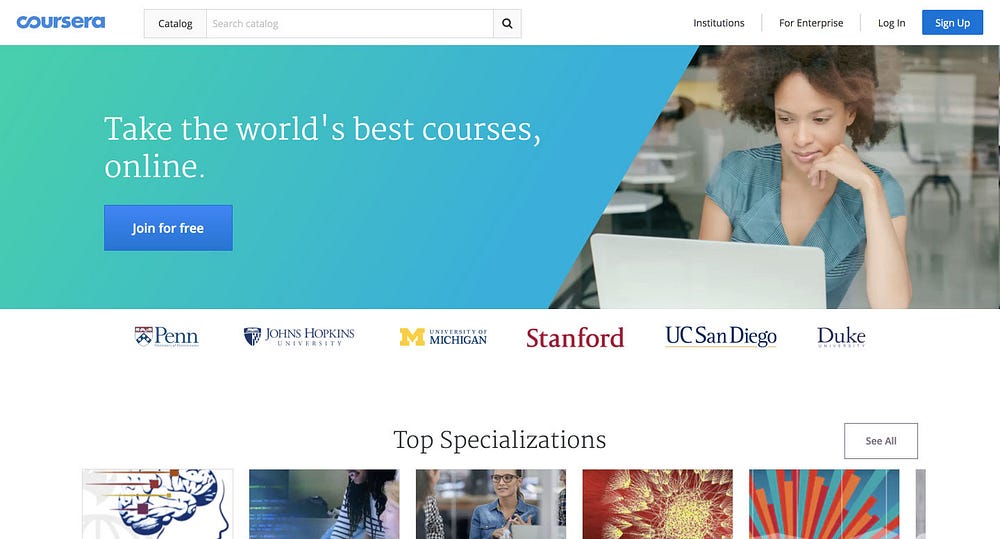
Coursera
is an online education provider that offers online courses, popularly
known as “MOOCs” or Massive Open Online Courses, from top universities
around the world.
Currently, Coursera has 150 such university partners from 29 countries around the world. These partners include Stanford, Duke, Penn, Princeton, Michigan, Peking, and HEC Paris. Coursera has also started partnering with companies like IBM, Google, and PwC who are launching online courses on Coursera’s platform.
Can you get a Coursera Certificate for Free?
Certificates were free in Coursera’s early days. Unfortunately, you can’t get a free certificate for completing Coursera courses now. MOOC providers across the board have stopped offering free certificates for completing their online courses.
Is Coursera Still Free?
Yes and no. There are definitely a few courses on courses on Coursera that are paid only. Examples of these would be Writing Skills for Engineering Leaders or Google’s Computing, Storage and Security with Google Cloud Platform. At this point, I am not sure how many of these kinds of courses are out there.
At
the time of writing this article, a vast majority of the courses have
some element of “free” — mostly the videos are free to watch, but you
need to pay if you want access to graded assignments and certificates.
If you search for free courses on
Coursera’s website, you will see a sticky note at the top of the search
results basically saying what I mentioned. However, Coursera still has a
few courses for which even the graded assignments are completely free.

Remember to Audit
Coursera
calls having access to the free portions of a course “auditing the
course.” I first came across this concept of auditing when I went to
Georgia Tech, where I got my Masters in Computer Science. I got my
undergrad degree in India and we didn’t have the concept of auditing
there.
Here is a quick definition from a university’s FAQ
Auditing a course allows a student to take a class without the benefit of a grade or credit for a course.
So when you are trying to enroll in Coursera courses for free, look for the word audit.
We will explain below — with screenshots — how to sign up for
Coursera’s audit mode, but Coursera keeps tweaking their UI or testing
different iterations so what’s on your screen on Coursera’s website may
be different to what’s presented below.
How to Enroll in Coursera Courses for Free?
Find the Course Page — You can only sign up for free via individual course pages
Coursera has two main products: online courses and Specializations.
Specializations
basically consist of a sequence of online courses designed to enable
you to master a particular topic. Some Specializations have a capstone
project as the last course in the sequence. Not all courses are part of
Specializations, but a majority of courses that are newly launched are
part of a Specialization.
Some
of the older courses that were around twelve weeks long have been
converted into Specialization format, with the original course split
into multiple courses.
As
you browse/search courses on Coursera, you will notice that
Specializations and courses are mixed together in results. For
Specializations, you will see the number of courses in a given
Specialization below its name. You will also notice that Specializations
are listed higher in the rankings than regular courses.
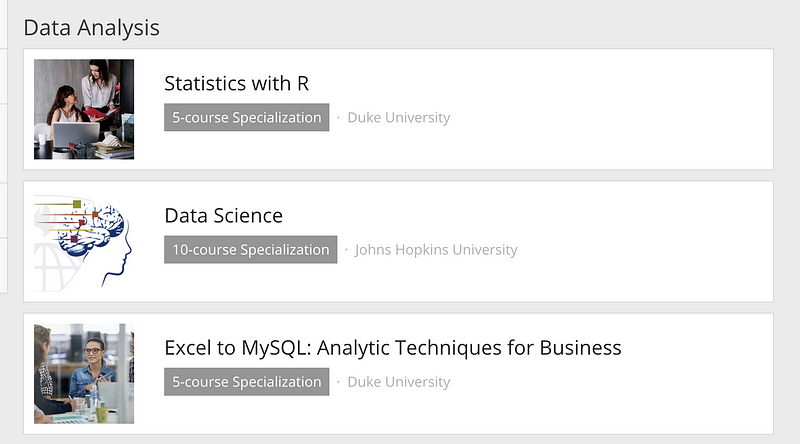
Specializations
pages do not allow you to sign up for their individual courses. If you
click on the “enroll” button, you will only be given an option to pay
for the Specialization.
To
sign up for free, you need to find the individual course pages.
Unfortunately, even though it lists the courses in the Specialization,
the Specialization page doesn’t link to the individual courses.
If
you scroll down a bit you will see a list of courses that are part of
the Specialization. To visit the course’s page, copy the course name and
paste it in the search bar on Coursera.
Better yet, you could search for the course on Class Central — https://www.class-central.com/search. We will also show you results of similar courses that are not on Coursera.
Enroll on the Course Page
At
this point, I am assuming you are on the Coursera course page of the
course you are interested in, and that you are signed in to Coursera.
Coursera has two different monetization models for users to purchase the non-free portions of the course.
The
first is a straightforward model: buying certificates for individual
courses. In this case, once you click on “enroll” you will see two
options, one of which (“Full Course, No Certificate”) allows you to sign
up for free (as shown below).
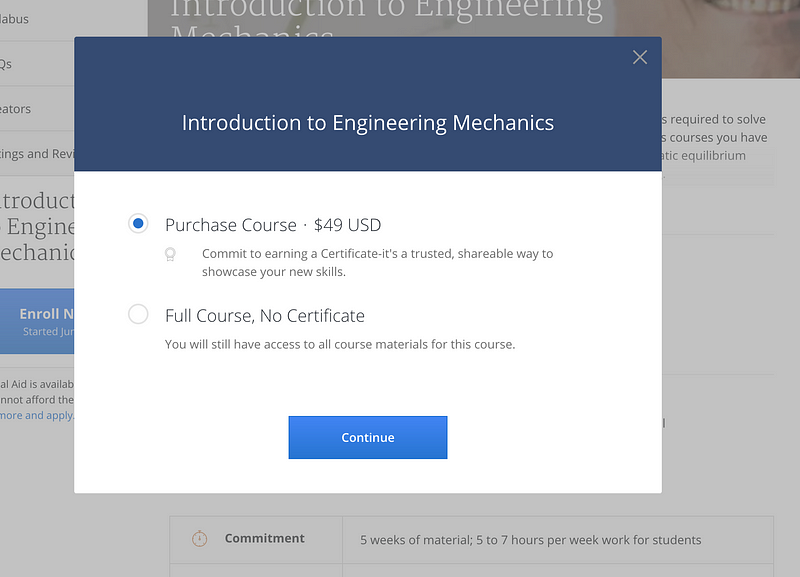
Some
courses might not have the “full course” option (i.e. the graded
assignments are behind a paywall). In that case, the second option will
show as “audit.” Select “audit” and then click on “continue” to sign up
for free.
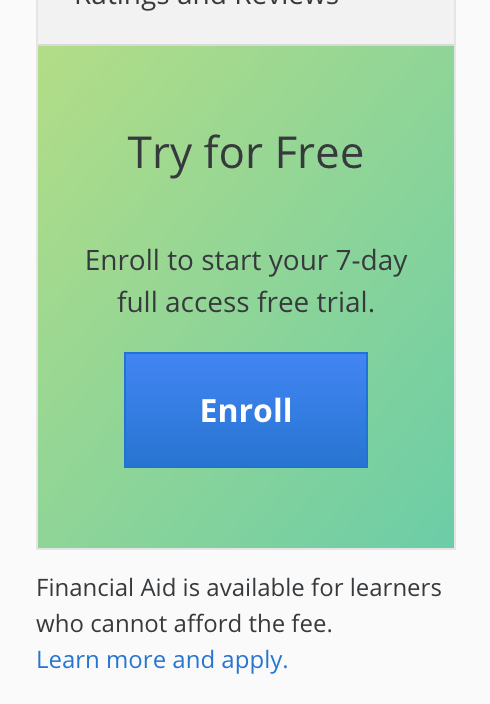
The
second monetization method is a monthly subscription-based model. By
paying a monthly subscription fee (starting from $39/month), you get
access to premium features for all the courses that are part of the
Specalization. Your access ends once you stop paying for the
subscription.
If
you are signed into Coursera and on a course page for a course that is
part of a Specialization, you will see the blue “enroll” button
surrounded by green background. It will have the text “try for free”
above it. Note: this button surrounded by green is only shown to users
who are signed in to Coursera. Pricing information is not shown to
learners who are not signed in.
Once
you click on “enroll,” you should see a popup that prompts you to sign
up for a free trial (as shown below). At the bottom right of this popup,
you will see a small “audit” link. Click on that link to enroll in the
course for free. You will be able to watch videos and participate in
discussion forums but won’t have access to graded assignments.
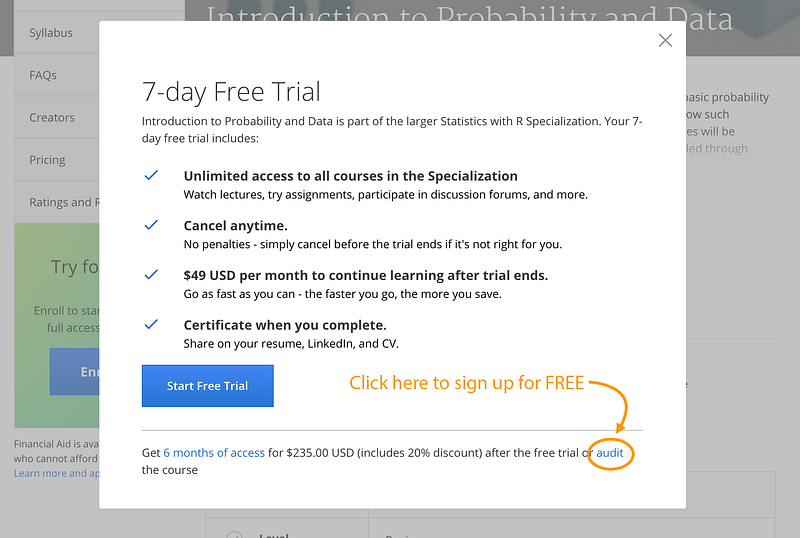
I
hope you found this guide useful. If you found any part of the guide
confusing, do let me know and I will update the guide to be clearer.
Also, do comment if you find a Coursera course that doesn’t fit the
patterns described above.
No comments:
Post a Comment